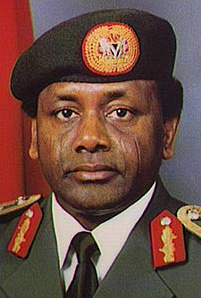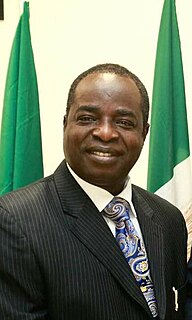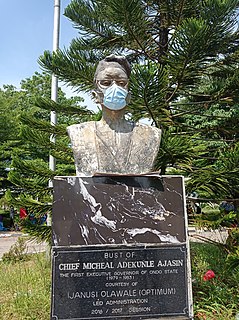Related Research Articles

Sani Abacha GCFR was a Nigerian military general who served as the military head of state of Nigeria from 1993 until his death in 1998. He was also Chief of Army Staff between 1985 to 1990; Chief of Defence Staff between 1990 to 1993; and Minister of Defence. In 1993, Abacha became the first Nigerian Army officer to attain the rank of a full military general without skipping a single rank.

Moshood Kashimawo Olawale Abiola GCFR, also known as M. K. O. Abiola was a Nigerian businessman, publisher, and politician. He was the Aare Ona Kankafo XIV of Yorubaland and an aristocrat of the Egba clan.
Anarchism in Nigeria has its roots in the organization of various stateless societies that inhabited pre-colonial Nigeria, particularly among the Igbo people. After the British colonization of Nigeria, revolutionary syndicalism became a key factor in the anti-colonial resistance, although the trade union movement deradicalized and took a more reformist approach following the country's independence. The contemporary Nigerian anarchist movement finally emerged from the left-wing opposition to the military dictatorship in the late 1980s and saw the creation of the Awareness League.
Baba Gana Kingibe OV GCON is a Nigerian diplomat, politician and civil servant who has held several high ranking government offices, culminating in his appointment as the Secretary to the Government of the Federation from 2007 to 2008. He spent over a decade in the Foreign Service cadre and has been in politics since the 1970s serving six heads of state; most recently as a member of the inner circle of President Muhammadu Buhari.
Cornelius Olatunji Adebayo is a former Senator of Nigeria, who became a state governor, and later was head of the Nigerian Federal Ministry of Communications.

The Third Republic was the planned republican government of Nigeria in 1993 which was to be governed by the Third Republican constitution.
General Donaldson Oladipo Diya is a Nigerian general who served as Chief of the General Staff, was the de facto Vice President of Nigeria under military head of state General Sani Abacha from 1994 until his arrest for treason in 1997. He previously served as Chief of Defence Staff and was Military Governor of Ogun State from January 1984 to August 1985.

Kayode Oladele is a Nigerian human rights activist, lawyer and politician who was a member of the Nigerian House of Representatives representing Yewa North/Imeko-Afon Federal Constituency, Ogun State, from 2015-2019. He was the Chairman of the House of Representatives' Committee on Financial Crimes and member of the House Committees on Justice, Human Rights, Rules and Business, Environment, Healthcare Services and Agricultural Institutions. He was elected under the platform of the All Progressives Congress on 11 April 2015. Prior to that, he was Chief of Staff, office of the Chairman, Economic and Financial Crimes Commission (EFCC), a law enforcement agency that investigates financial crimes.
Chief Abraham Aderibigbe Adesanya was a Nigerian politician, lawyer, activist, welfarist, and liberal progressive. He was the son of a famous and powerful traditional healer, the late Oloye Ezekiel Adesanya, who lived between the 19th and 20th centuries.
Ibrahim Coomassie was a Nigerian police officer and the 9th Inspector General of Nigerian Police serving between 1993 and 1999, under the military governments of Generals Sani Abacha and Abdulsalami Abubakar. He died on Thursday 19 July 2018 after a protracted illness. He was 76 years old.

Michael Adekunle Ajasin was a Nigerian politician who was elected Governor of Ondo State on the Unity Party of Nigeria (UPN) platform during the Nigerian Second Republic.
Abdulkareem Adisa was a Nigerian major general who was military governor of Oyo State during the military regime of General Ibrahim Babangida. He was convicted for involvement in an attempted coup against military head of state General Sani Abacha in 1997, and was on death row when Abacha died in June 1998. He was subsequently pardoned.
Colonel Ahmed Usman was a Nigerian military administrator of Ondo State and later Oyo State during the military regime of General Sani Abacha.
Air Commodore Dan Suleiman was a member of General Murtala Muhammed's supreme military council in Nigeria between July 1975 and March 1976, and was military governor of Plateau State from March 1976 to July 1978 after it had been created from part of the old Benue Plateau State. After the return to democracy in 1999 in the Nigerian Fourth Republic, Suleiman became chairman of the Middle Belt Forum (MBF), a socio-political group representing the people of the Middle Belt of Nigeria.
Mohammed Arzika was appointed Nigerian Minister of Communications from June 1999 to June 2001 in the cabinet of President Olusegun Obasanjo. He died after a brief illness on 9 June 2015.
Lamidi Ona-Olapo Adesina was an educator who became governor of Oyo State in Nigeria on 29 May 1999 during the 1999 Oyo State gubernatorial election as a member of the Alliance for Democracy (AD) party.

Presidential elections were held in Nigeria on 12 June 1993, the first since the 1983 military coup ended the country's Second Republic. The elections were the outcome of a transitional process to civilian rule spearheaded by the military ruler, Ibrahim Badamasi Babangida (IBB). The unofficial result of the election – though not declared by the National Electoral Commission (NEC) – indicated a victory for Moshood Kashimawo Olawale Abiola of the Social Democratic Party (SDP), who defeated Bashir Tofa of the National Republican Convention (NRC). The winner of the election was thus never declared as the elections were annulled by IBB, citing electoral irregularities. The annulment led to protests and political unrest, including the resignation of IBB and a weak interim civilian government, and culminated in the continuation of military rule in the country with Sani Abacha ascending to power as the military head of state via a bloodless coup later in the year.

Nigeria–South Africa relations refer to the bilateral relations between Nigeria and South Africa. Both countries are former British colonies, and both countries are members of the Commonwealth of Nations and African Union. Nigeria has a high commission in Pretoria and consulate general in Johannesburg. South Africa has a high commission in Abuja.

Kayode Soyinka is a Nigerian journalist, publisher, and author.
The Campaign for Democracy (CD) is a Nigerian civil society group that advocates for greater democracy in Nigeria. The group was first organized in the early 1990s to demand an end to the country's military dictatorship. The coalition organized demonstrations, strikes, and other civil resistance actions against the regime of Nigerian president Ibrahim Babangida from 1991–1993, particularly against the nullification of the 1993 Nigerian presidential election. At its peak, the coalition had more than 40 affiliated groups.
References
- ↑ "Nigeria: US Policy". UNIVERSITY OF PENNSYLVANIA - AFRICAN STUDIES CENTER. 12 June 1997. Retrieved 26 November 2009.
- ↑ Eghosa E. Osaghae (1998). Crippled giant: Nigeria since independence. Indiana University Press. p. 294. ISBN 0-253-21197-2.
- ↑ Gilbert M. Khadiagala, Terrence Lyons (2001). African foreign policies: power and process. Lynne Rienner Publishers. p. 30. ISBN 1-55587-966-7.
- ↑ "Background Note: Nigeria". US Department of State. Retrieved 26 November 2009.
- ↑ "CRISIS IN NIGERIA - Call for Oil Embargo". Earth Action. July 1996. Retrieved 26 November 2009.
- ↑ "Africa Denounces Arrests of Human Rights and Pro-Democracy Activists and Continuing Disintegration of Rule of Law". Human Rights Watch. 8 June 1995. Retrieved 26 November 2009.
- ↑ "Nigeria May Ask U.S. Ambassador About Bombings". New York Times. 17 July 1997. p. A9. Retrieved 16 May 2020.
- ↑ "Nigeria: Information on the Persecution of National Democratic Coalition Members in Nigeria". United States Bureau of Citizenship and Immigration Services. 27 October 1999. Retrieved 26 November 2009.
